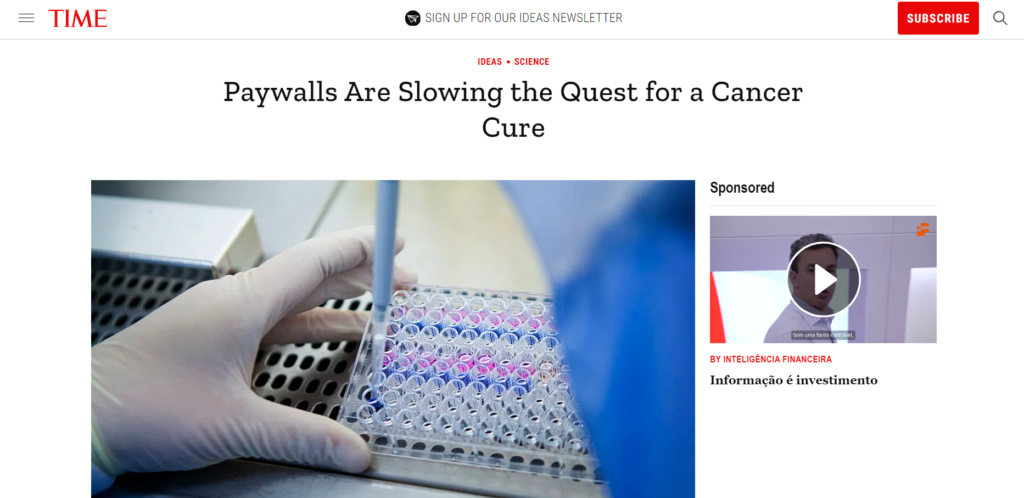the health strategist
platform
the most compreehensive knowledge portal
for continuous health transformation
and digital health- for all
Joaquim Cardoso MSc.
Chief Research and Strategy Officer (CRSO),
Chief Editor and Senior Advisor
December 20, 2023
What is the central message?
Despite advancements in cancer research and treatments, cancer remains the leading global cause of death, claiming 10 million lives annually.
Recognizing the need for comprehensive action, the White House has announced a $240 million investment in the revamped Cancer Moonshot initiative, aiming to reduce the cancer death rate by half in the next 25 years.
The following summary emphasizes that while funding is crucial, unrestricted access to the latest research is equally vital.
The White House’s Office of Science and Technology Policy (OSTP) has issued rules making all federally funded published research, not just for cancer but for all life-threatening diseases, freely available without delays or subscription paywalls.

Executive summary
What are the key points?
Economic and Human Toll of Cancer:
- Cancer imposes a significant economic burden, exceeding $21 billion annually, with an estimated cost of $25 trillion by 2050.
- Despite progress in research and treatments, cancer remains the primary cause of death globally, taking 10 million lives each year.
Cancer Moonshot Initiative:
- The White House invests $240 million in the Cancer Moonshot initiative, aiming to halve the cancer death rate in the next 25 years.
- The initiative recognizes the need for both funding and open access to scientific research for accelerating progress.
Open Science and COVID-19 Success:
- The article highlights the success of Open Science during the COVID-19 pandemic, where rapid data sharing led to the quick development of vaccines.
- Advocates for applying the principles of Open Science to cancer research for faster breakthroughs and improved outcomes.
Challenges of Scientific Publishing:
- Scientific publishing often relies on limited, paywalled access, hindering the free dissemination of crucial research.
- More than half of the world’s published research is behind expensive subscriptions, creating barriers to knowledge accessibility.
Importance of Open Science in Cancer Research:
- The article argues that scientific research funded by the public should be freely accessible to taxpayers.
- Open Science is seen as a promising strategy for achieving the Cancer Moonshot’s goals and addressing global health challenges.
Call for Action:
- The summary calls for a mandate for Open Science in cancer research, urging science policymakers, funders, and publishers to embrace this approach.
- Congress is urged to codify the OSTP guidelines as federal law to ensure long-term commitment to Open Science.
What are the key examples?
- COVID-19 Vaccines and Open Science: The article cites the rapid discovery of COVID-19 vaccines as a prime example of the effectiveness of Open Science. During the pandemic, all COVID-19 research and data were made available through Open Science, enabling quick development of treatment and vaccine solutions.
- Scientific Publishing Challenges: The article discusses the challenges of the subscription paywall model in scientific publishing. It highlights that more than half of the world’s published research is locked behind expensive subscriptions, limiting access to scientists not affiliated with well-funded academic institutions.
- Success of Open Science Advocates: Frontiers, identified as the most-cited multidisciplinary scientific publisher globally, is mentioned as a proponent of Open Science for the past 15 years. The article suggests that leading research organizations like NASA and funders in Australia, Europe, and the U.K. are also transitioning to Open Science models.
What are the key statistics?
- Global Economic Burden of Cancer: The economic burden of cancer on patients and their families exceeds $21 billion annually. The estimated cost is projected to reach $25 trillion between the announcement date and 2050.
- Annual Global Deaths Due to Cancer: Cancer claims the lives of 10 million people annually, making it the leading cause of death globally.
- Global Scientific Publishing Industry: The global scientific publishing industry is identified as a $27 billion annual business, dominated by a few companies. The traditional subscription-based model is noted for being slow to change.
- Public Funding for Cancer Research: American taxpayers collectively fund $5 billion in cancer research each year, emphasizing the public investment in scientific advancements.
- White House Investment in Cancer Moonshot: The White House announces a $240 million investment in the reinvigorated Cancer Moonshot initiative, aiming to cut the cancer death rate by half in the next 25 years.
- Access to Published Research: The article emphasizes that unless scientific research is made freely and immediately accessible, vital knowledge that could help save or extend millions of lives, especially amid unprecedented cancer drug shortages, remains limited in its dissemination.
Conclusion
With cancer claiming 10 million lives annually, the article emphasizes the critical role of Open Science in achieving the goals of the Cancer Moonshot initiative.
It calls for a paradigm shift in scientific publishing, urging policymakers and funders to mandate Open Science practices for the benefit of public health and scientific progress.
DEEP DIVE

This summary is based on the article “Paywalls Are Slowing the Quest for a Cancer Cure”, published by Time and written by Julia Kostova on December 19, 2023.
To read the original publication, click here.












